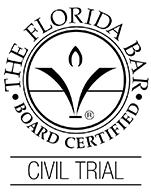Any car accident can be a scary and traumatic experience, not to mention that it can cause devastating injuries. Even a seemingly minor accident can lead to severe injuries and medical bills that you aren’t prepared to pay for.
The first part of the battle is simply making sure to seek treatment after your accident. The second part is making sure that you do everything you can to ensure that you physically and financially recover from the ordeal.
The insurance company will do anything they can do deny or devalue your claim, so it’s important to think about how they may try to twist your words and actions to do so. Below, we discuss three common mistakes to avoid when seeing a doctor after being injured in a Lakeland car accident.
1. Failing to Report the Extent of Your Injuries
After a car crash, it’s important to report all of the parts of your body where you have pain or discomfort, not just the injuries that are obvious or can be seen.
For instance, let’s say you’re in a car crash and sustain a broken knee cap. Your healthcare providers will no doubt understand that this part of your body must be treated immediately. However, you may also have neck and back pain that the doctors and nurses can’t visually see, so they won’t know about it unless you tell them.
When your medical records come in a few months later, they may say you had knee pain but denied any other injuries, such as neck and back pain, even if you don’t remember them specifically asking about it.
Over time, your knee may get better because you received the proper treatment after the accident. But, your neck and back pain could be a long-term or even lifelong problem, leading to physical limitations as well as ongoing medical requirements.
In this case, the insurance company may review your medicals records and determine that, since you didn’t initially report neck or back pain after the crash, there’s no way that your injuries were directly caused by the accident at hand.
This means you could potentially be on the hook for these ongoing medical bills simply by not specifying to your doctor the entire extent of your injuries.
2. Not Communicating Any Past Problems or Injuries
Secondly, you must always be sure to tell your healthcare providers if you’ve had any past injuries or problems in the same area of your body that’s now injured.
Going off of the scenario above, let’s say that your doctor recommends you have knee surgery to repair your broken knee cap. However, you failed to tell the doctor about a prior sports injury to your knee a few years back.
The insurance company will argue that, if your doctor knew about this prior injury, then they would not have said that your knee problems are entirely related to the car accident. But, if you tell the doctor about this during the initial exam, they can specifically record that this prior injury was not the cause of your knee surgery.
One of the most common misconceptions is that you cannot file a claim if you were already injured. On the contrary, however, you can absolutely still file a claim if you had prior problems to the same body part by claiming aggravation of a preexisting condition.
3. Thinking You Don’t Need Medical Treatment
Lastly, do not make the mistake of thinking that you don’t need medical treatment, especially if a doctor specifically gives you a treatment plan to follow. When it comes to injuries, things are not as they always seem on the surface.
After a car accident, you may think you were lucky enough to walk away entirely injury-free. Because of this assumption, you end up not going to the hospital or getting a proper medical diagnosis.
But, some injuries take a longer period of time to show full symptoms. What happens if you start feeling pain or discomfort days or weeks later? The insurance company will probably say that you didn’t receive medical treatment directly after the accident, so the pain you are experiencing cannot be proven directly related to the accident.
You may have actually received immediate medical attention, but started feeling better before ending your doctor’s recommendations on a treatment plan. So, you decide to stop following your doctor’s orders.
This can also jeopardize your claim. You are required to do your best to improve your condition by following medical advice. If you stop following your doctor’s advice before he or she recommends, the insurance company can say that you didn’t take proactive steps to get better and so they are liable for paying the full extent of your injuries.
Injured in a Car Accident?
At Dismuke Law, our legal team understands how clients and their families can be impacted because of a singular event, such as a car accident. Youn should not have to front the bills for your injuries and an accident that you didn’t even cause.
Our job is to help you obtain maximum compensation for your injuries to pay for:
-
Medical expenses
-
Lost wages and lost earning capacity
-
Emotional damages
-
Diminished quality of life
With board certifications and decades of legal experience, our firm is ready to fight on your behalf.
Want to learn more about your legal options? Contact Dismuke Law at (863) 292-6922 to schedule a free consultation.


![cftla-member[2]](https://www.1800askdave.com/wp-content/uploads/2022/03/cftla-member2.png)
![cftla-member[3]](https://www.1800askdave.com/wp-content/uploads/2022/03/cftla-member3.png)










